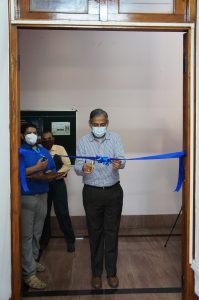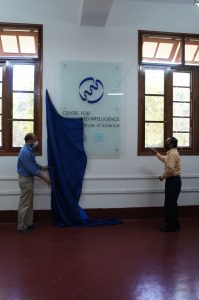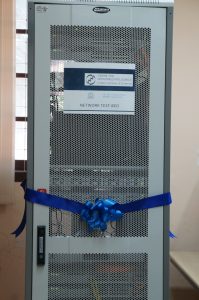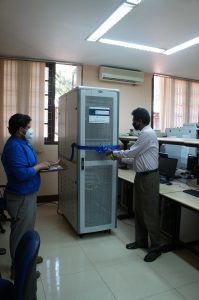The Centre for Networked Intelligence, IISc inaugurated its state-of-the-art networking lab on 18 January 2021. The lab, developed in collaboration with Cisco India, has a network testbed which will enable researchers and students to develop applications, algorithms and experiments in emerging areas in communication and computer networking such as software-defined networking, network function virtualisation, and network slicing. The testbed is equipped with network control, management, and analytics platforms (Cisco DNAC centre), wireless controller, enterprise switches and routers, WiFi-6 access points, and an identity management suite.




CNI Networking Lab, developed in collaboration with Cisco was inaugurated by Krishna Sundaresan, VP Engineering, Cisco India and SAARC. The centre’s logo was unveiled by Prof. Yadati Narahari, Chair, Division of EECS, IISc.
Seminar Series
Associated with the inauguration function, the centre organised a seminar series on next generation networking technologies. The seminar had a distinguished set of speakers.
The meeting can be accessed via this link.
The seminar schedule is as below:
| Time | Agenda | Speaker |
|---|---|---|
| 02:00 pm – 02:05 pm | Introduction about the Centre | |
| 02:05 pm – 03:00 pm | Performance of TCP Controlled File Transfers over Infrastructure WiFi Networks: Insights into Network Effects | Prof. Anurag Kumar |
| 03:00 pm – 03:55 pm | Connecting the Unconnected in 5G and Beyond | Prof. Abhay Karandikar |
| 03:55 pm – 04:50 pm | Information Centric Networking | Dr. Mouli Chandramouli |
| 04:50 pm – 05:00 pm | Conclusion and vote of thanks. |
Recording of the talk is available here.
Slides of the talk are available here.
Time: 18 Jan 2021, 02:05 pm – 03:00 pm
Speaker: Prof. Anurag Kumar
Title: Performance of TCP Controlled File Transfers over Infrastructure WiFi Networks: Insights into Network Effects
Abstract:
Over the past two decades, WiFi has emerged as the default wireless access technology in offices, homes, universities, and industrial establishments. Over this period, the core WiFi standards have evolved through IEEE 802.11, 802.11b, 802.11a, 802.11g, 802.11n, 802.11ac 802.11ax (soon to be ratified, and also called WiFi6), and the emerging 802.11be. Until IEEE 802.11n, opportunities for WiFi nodes to transmit over the wireless medium, have been controlled by the Distributed Coordination Function (DCF), the IEEE 802.11 implementation of CSMA/CA. IEEE 802.11ax and beyond now include OFDMA, but opportunities for nodes to access the wireless medium are still governed by DCF; once an access point (AP) gets access, it can transmit to or receive from multiple nodes by utilising OFDMA and multi-user MIMO. Over the past two to three decades, the Internet has become the ubiquitous technology for packet networking, agnostic to the physical communication technologies interconnecting the endpoints. The predominant transport protocol (in terms of volume of data carried) is TCP, and file transfer (either via HTTP or FTP) is a major application that runs over TCP.
This will be a tutorial level presentation of stochastic modeling that aims to provide insights into the performance of TCP controlled file transfers over WiFi and DCF, with the eventual goal of building an understanding of file transfer performance in multi-AP networks. We will begin the presentation from the now classic fixed-point model for saturated nodes in a single AP setting, and then describe models for predicting TCP controlled file transfer throughputs. Network effects will be brought in by showing the effects of channel errors (induced by co-channel interference), and by some simple models of interfering co-channel multi-AP networks. While the models will be largely developed for now “legacy” networks up to IEEE 802.11n, models for 11ac and 11ax networks can be built as extensions of the models we present, and we will provide insights into how this could be done.
Bio:
Prof. Anurag Kumar, B.Tech (1977) IIT Kanpur, PhD (1981) Cornell Univ., was a Member of Technical Staff in AT&T Bell Laboratories (1981-1988), before returning to India and joining the Indian Institute of Science (IISc) as a faculty member in the ECE Department. He became a Professor in 1996, was the Director of the Institute during 2014-2020, and now, after superannuation from IISc, he is an Honorary Professor. He has published almost 200 peer reviewed papers in journals and conferences, in the area of communications networking and distributed systems.
Prof. Kumar returned to India at a time when the telecommunications revolution was just taking off and the Internet was just a fledgling network. He was one of the leaders of the ERNET project that established India’s first nationwide Internet, that carried academic traffic for over a decade. Prof. Kumar was one of the early researchers in India in the mathematical approach to understanding and designing modern communication networks. He has led the authorship of two major text books on communication networking that have been used around the world.
He was the 1977 President’s Gold Medalist in IIT Kanpur. He received the IISc Alumni Award for Excellence in Engineering Research for 2008. He has been elected Fellow of the IEEE, the Indian National Science Academy (INSA), the Indian National Academy of Engineering (INAE), the Indian Academy of Science (IASc), and The World Academy of Sciences (TWAS). During the period 2005-2009, he was an area editor for the IEEE/ACM Transactions on Networking and was then on its steering committee from 2010-2014. He received the 2015 Vasvik Award for Information Technology, and the 2017 IEI-IEEE Award for Engineering Excellence. He is a recipient of the J.C. Bose National Fellowship, awarded by the Department of Science and Technology, for the period 2011-2021.
Time: 18 Jan 2021, 03:00 pm – 03:55 pm
Speaker: Prof. Abhay Karandikar
Title: Connecting the Unconnected in 5G and Beyond
Abstract:
In this talk, we review the challenges in connecting the unconnected and argue on rethinking the requirements of 5G and beyond systems. We propose an architecture called “Frugal 5G” for affordable broadband access and IEEE P2061. We discuss the architectural elements of Frugal 5G and its implementation within 3GPP 5G framework. Specifically, we present an OpenFlow based RAN architecture which enables unified access control at the edge. Finally, we show how by using Software Defined Networking and Network function virtualization, we can realize the architecture for providing affordable connectivity.
Bio:
Prof. Abhay Karandikar is currently serving as the Director of IIT Kanpur. He is also Member (Part-Time) of Telecom Regulatory Authority of India (TRAI). Earlier, he was the Dean (Faculty Affairs) and the Institute Chair Professor in the Department of Electrical Engineering at IIT Bombay. He has been instrumental in developing many path breaking technologies and has been at the forefront of several large initiatives both at the institute and the national level. He was the founding member and former chairman of the Telecom Standards Development Society of India (TSDSI), India’s standards body for telecom. He has also served as the coordinator of Tata Teleservices IIT Bombay Center of Excellence in Telecommunications (TICET) and the National Center of Excellence in Technology for Internal Security.
Time: 18 Jan 2021, 03:55 pm – 04:50 pm
Speaker: Dr. Mouli Chandramouli
Title: Information Centric Networking
Abstract:
Information Centric Networking is paradigm shift in the usage model of the Internet, along with the pressing needs for, among others, better security and mobility support.
In this talk, an overview of the research and development efforts in the area of Information- Centric Networking (ICN) as a foundation shall be presented. The key topics shall be : (a) identify the core functionalities of ICN architectures, (b) describe the key ICN proposals in a tutorial manner, highlighting the similarities and differences among them with respect to those core functionalities, and (c) to identify the key weaknesses of ICN proposals and outline the main unresolved research challenges in this area of networking research.
Bio:
Mouli Chandramouli is currently working as Data Scientist at Cisco Systems, Bangalore in the area of application Machine Learning algorithms for analytics of Network Telemetry and Network Inference.
Mouli Chandramouli received his M. S. and Ph.D. from University of Arizona, Tuscon, AZ in the area of Stochastic Process and Queueing Theory. Prior work experience at AT&T Bell Laboratories, Holmdel, NJ, Bell Communications Research, NJ in the area of network performance modelling and Dynamicsoft, NJ a startup company focussed on VOIP products based on SIP Protocol which was acquired by Cisco Systems. At Cisco Systems, his work has been is in the areas of MPLS networks, Energy Management for networking devices and distributed embedded network analytics algorithms.